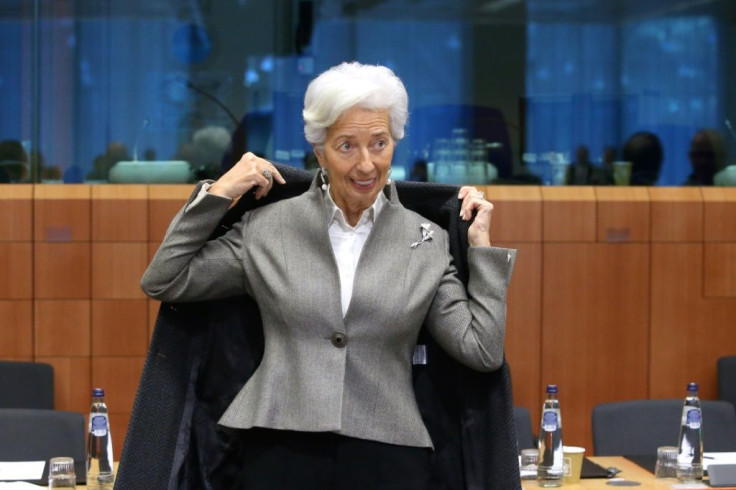ECB Holds Fire But 'Carefully Monitoring' Euro's Rise

The European Central Bank is carefully monitoring the euro's recent rise, president Christine Lagarde said Thursday, as she warned that the eurozone's recovery remained mired in uncertainty over the pandemic.
The euro area economy shrank by a record 11.8 percent in the second quarter of the year but Lagarde said the latest data suggested "a strong rebound" in the third quarter as lockdowns eased.
But fears are mounting about a fresh uptick in coronavirus cases across Europe that could trigger renewed restrictions in hard-hit countries like France and Spain.
The jump "in coronavirus infection rates during the summer months constitutes headwinds to the short-term outlook", Lagarde told an online press conference in Frankfurt.
Grilled by reporters about the euro's rise against the dollar, the ECB chief acknowledged concerns that the currency's upward surge could brake price growth and keep the ECB's inflation target further out of reach.
The issue was "extensively discussed", Lagarde said.
The euro last week touched $1.20 for the first time since 2018, from $1.06 in March.
Although Lagarde stressed that the ECB does not target the euro-dollar exchange rate, the mandate of the bank is to maintain "price stability and clearly to that extent appreciation of the euro is something to be monitored carefully".
ING bank analyst Carsten Brzeski said Lagarde's comments suggest the ECB was "concerned about the stronger euro but not too concerned just yet".
A stronger euro hurts the competitiveness of eurozone exporters and makes imports cheaper, driving down consumer prices.
It adds another headache to a complicated economic picture for the ECB, which has launched unprecedented stimulus measures to nurse the virus-stricken economy back to health.
ECB governors on Thursday kept their ultra-loose monetary policy in place, holding interest rates at historic lows.
They also made no changes to their 1.35-trillion-euro ($1.6-trillion) pandemic emergency bond-buying scheme, aimed at keeping borrowing costs low to encourage consumer spending and business investment.
Lagarde said the central bank would continue to provide an "ample degree" of monetary accommodation and stood ready to adjust its actions to support the 19-nation currency club through the Covid-19 crisis.
"The strength of the recovery remains surrounded by significant uncertainty as it continues to be highly dependent on the future evolution of the pandemic and the success of containment policies," she said.
The newest ECB forecasts on Thursday suggested this year's downturn would be less severe than initially feared, with the eurozone economy predicted to shrink 8.0 percent -- compared with the previous prediction of -8.7 percent.
The recovery in 2021 and 2022 is forecast to be slightly smaller however compared with June's predictions.
The inflation outlook remained largely unchanged and is expected to inch up to 1.3 percent in 2022 -- still far off the ECB's inflation target of "close to, but below" 2.0 percent.
Highlighting how far away the goal is, eurozone inflation even turned negative in August for the first time in four years, coming in at -0.2 percent.
Lagarde put the August dip down to temporary factors like a sales tax cut in Germany and falling oil prices, brushing off concerns that the eurozone could be headed for the dreaded spectre of deflation.
Deflation, or a spiral of falling prices, can deter customers from spending in anticipation of even cheaper prices, creating pressure on businesses who may end up cutting jobs or closing down.
"Deflationary risks... have receded in September," Lagarde said.
"Listening to president Christine Lagarde, you wouldn't guess that core inflation just fell to an all-time high in the euro area," said Pictet Wealth Management strategist Frederik Ducrozet.
He predicted that the bank would be doling out more stimulus before the year is over.
"Our view remains that the reality of weak growth and disinflationary pressures will ultimately force the ECB to increase" its pandemic bond purchases, he said.
The ECB's massive pandemic emergency asset-purchasing scheme, known as PEPP, is set to run "at least" until the end of June 2021.
But many analysts believe the region's fragile and uneven rebound will require ECB policymakers to extend and even enlarge the PEPP stimulus, possibly at the December meeting.
Lagarde herself said it was "very likely" that the ECB would use up the whole 1.35 trillion euro PEPP envelope.
© Copyright AFP {{Year}}. All rights reserved.





















